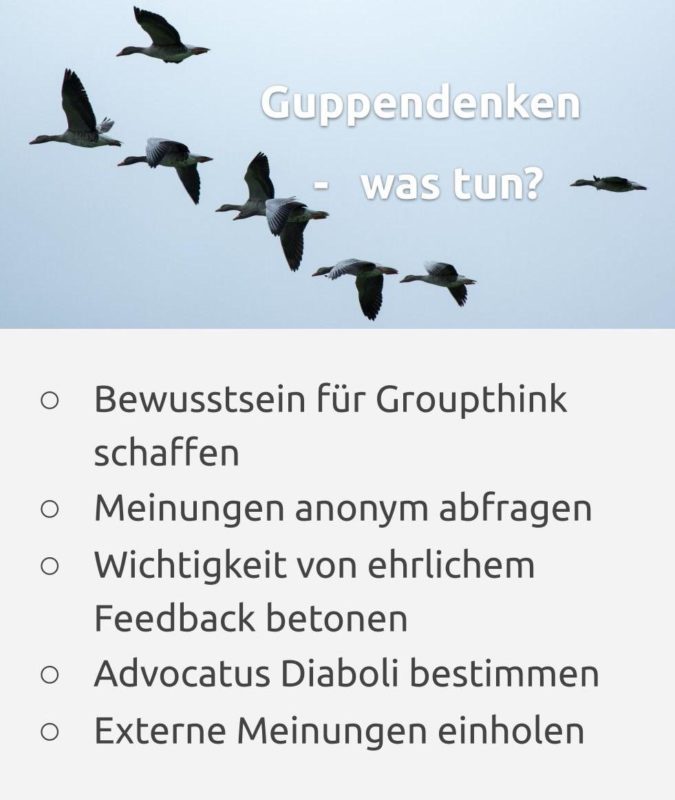Nodding, approving murmur, empty looks around the room. A retrospective shouldn't work like this. And yet, many teams report exactly such situations. How can it be that suddenly the opinions of five members of a team merge - without having a constructive discussion beforehand? In psychology this type of conformity groupthink (English Groupthink) called.
In the worst case, group thinking can lead to wrong decisions of catastrophic proportions. But don't worry: once you understand the symptoms of groupthink, what is the basis of it and how you can proceed if bad decisions are made in the team, you will be able to deal with this psychological phenomenon.
Examples of groupthink
The most well-known example of group thinking with blatant proportions is the Bay of Pigs invasion in 1961. At that time, the US government under John F. Kennedy decided to invade Cuba to overthrow Fidel Castro. The maneuver went wrong, Cuba took over 1100 prisoners.
The psychologist Irving Janis was the first to use the term Groupthink used to explain the decision-making processes of the US government in 1961. His conclusion was that a disrupted interaction and communication behavior of the group, in the form of an excessive pursuit of harmony, leads to wrong decisions (Janis, 1972).
Groups make a decision without considering alternatives first. The so-called illustrates what this means in concrete terms Abilene Paradox quite well (Harvey, 1974):
On a hot day, a family in Texas plays dominoes on the terrace. The father-in-law suggests going out for dinner in Abilene, 53 miles away. The man agrees. The woman is concerned about the heat and the long drive, but does not want to disappoint the others and agrees. The mother-in-law is the last to consent; says she hasn't been to Abilene in a long time.
The family comes back from the long trip exhausted in the evening. The food, like the ride, was not good. At first one of the four dishonestly says that it was a good trip. The mother-in-law replies that she would have preferred to have stayed at home and only came along for the sake of the others. The woman now also honestly says that she came with me so as not to disappoint anyone. After all, the father-in-law opened the door to the trip because he thought the others would be bored on the terrace.
There is a surprise in the group that they did something that none of them felt like doing - just because nobody said frankly what their opinion really is.
To the extent that is Abilene Paradox Although not to be compared with wrong political decisions, it nevertheless shows what the consequences of group thinking are.
Most Agile Coaches and Scrum Masters run in circles...
...fixing superficial symptoms. Time to use psychology to foster sustainable mindset change.
Conditions and symptoms for groupthink
In principle, group thinking is promoted by a combination of three factors.
- A high group cohesion: Group cohesion is the “we feeling” that arises from shared opinions and mutual sympathy. At best, high cohesion leads to team spirit; can unfortunately also have negative consequences like groupthink, since team members prefer to agree with the general opinion rather than hurt the positive climate.
- Structural mistakes of the organization: The second condition is not in the team, but in the organizational structure. Are there structural errors there, for example if the team is isolated from relevant information (as it can be the case with board members, for example? little information about operations forwarded in the company), decisions cannot be taken that are illuminated from all sides. A very directive management of the team can also be problematic, as the opinion of the leader is sometimes accepted.
- Situational context: If the team is under strong psychological stress, which is caused by external factors such as time pressure, decisions are often not carefully considered.
An experiment by the social psychologist shows how groupthink can be recognized Solomon Ash (1951) very striking: a group is given the task of recognizing which of the three lines is as long as the reference line.

If the majority of the group chooses an obviously wrong solution, the test person also chooses this. One of the symptoms of groupthink is a high level of conformity. In addition, teams often feel invulnerable to external attacks because they feel very secure about what they are doing. Another interesting aspect is that the uniformity pressure leads to the simple assumption that decisions are unanimous - although no clear consent was ever given. The silence of a team member is then considered, among other things, as approval of the general opinion.
The behavior of teams in which Groupthink occurs is mainly characterized by conformity. But what can you do now against this striving for unanimity - especially when it occurs in retrospectives?
Prevent groupthink - what to do about group thinking in retrospectives?
A simple, yet effective way to avoid groupthink is to first consult opinions anonymously. You can do this by, for example, asking about certain topics in advance of the retro items and then discussing the results in retro. This is how the retro tool from Echometer works: You can identify topics that interest you using psychological items and use them to design the retrospective. Anonymity not only allows each team member to express their opinion, but also does so in a psychologically safe atmosphere.
In order to avoid group thinking when discussing the anonymous survey, it should initially be emphasized how important it is that everyone can speak up and that people with “leadership position” in the team should hold back first. This can prevent these people from anchoring their opinions or assuming a common ground for further discussion.
Obtaining external opinions can also be helpful. Possible external parties are, for example, individual members of other teams or representatives of the customer. If you don't want to open the Retro to outsiders, you can do it Advocatus Diaboli to determine who challenges the group opinion using counter-arguments.

If you notice that there is often silence in your team when it comes to expressing opinions or that people's opinions are prematurely agreed, you should think about whether the team has a tendency to think in groups. Luckily, there are fortunately relatively simple means of preventing this in order to enable optimal decisions in the team. The first step is to become aware of this phenomenon in the team and to deal with it in a targeted manner. Because, as is well known, insight is the first step towards improvement.
#LosGet #ContinuousImprovement
By the way, if you are still looking for a suitable retro board (with 60+ agile retrospective formats), this post can help you: Comparing the 6 best retrospective boards
References
Asch, SE, & Guetzkow, H. (1951). Effects of group pressure upon the modification and distortion of judgments. Documents of Gestalt Psychology, 222-236.
Harvey, JB (1974). The Abilene paradox: The management of agreement. Organizational Dynamics, 3(1), 63-80. https://doi.org/10.1016/0090-2616(74)90005-9
Janis, IL (1972). Victims of groupthink: A psychological study of foreign-policy decisions and fiascoes. Houghton Mifflin.










